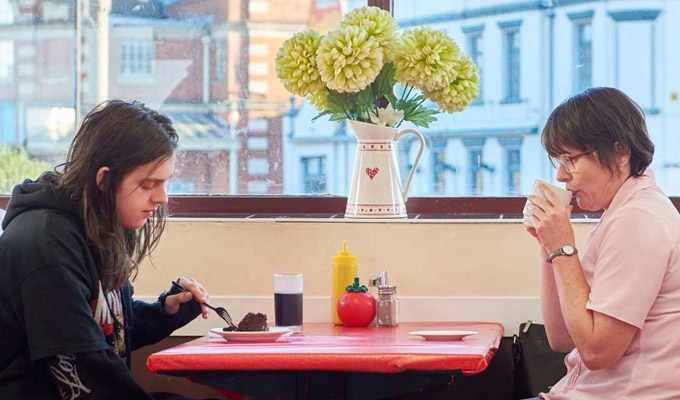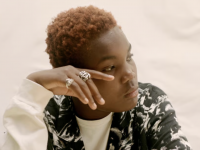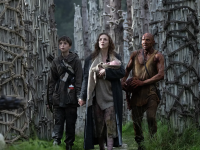
When plans to visit his dad in the US fall through, teenage metal-head Daniel Bagnold (Earl Cave) is forced to spend the six weeks of summer holiday with his timid librarian mum, Sue (Monica Dolan).
I really could not have anticipated how much I needed Days of the Bagnold Summer. It is an incredibly simple, unassuming movie, one that has snuck up on digital release with little fanfare but an assortment of positive reviews. While the premise sounded amusing, the most interesting thing about it to me initially was that it’s the directorial debut of The Inbetweeners’ Simon Bird, known for playing the hilariously obnoxious character Will McKenzie. It’s similar to when Richard Ayoade, The IT Crowd’s Moss, made his leap from Channel 4 comedy to directing with 2010’s excellent Submarine, also about the troubles of adolescence. Days of the Bagnold Summer doesn’t quite scour the depths that the heady Submarine did (ha), but it’s in simplicity that Bird and screenwriter Lisa Owens achieve a heartfelt adaptation of Joff Winterhart’s 2012 graphic novel of the same name. It is exactly the antidote to the anxieties of the day that I didn’t realise I needed; where at first its quaintness felt a bit underwhelming, by the end I came to see it as totally refreshing.
Even Bird’s filmmaking style is delightfully simple, in spite of the first-time director’s noticeable proclivities. For better or worse, Bird has a clear taste for Wes Anderson style framing techniques, namely tracking shots that utilise a flat space and symmetry to achieve an almost two-dimensional, puppet-show look. Bird also seems to love aperture shots, a technique whereby the characters in focus are placed in a frame within the frame. Daniel and Sue are often apart in their own apertures to signify their relational separation – one example being a scene in which Sue is in the background, framed by the kitchen window, and Daniel is in the foreground, framed by the living room window. The reason I say these filmmaking choices are ‘for better or worse’ comes down to how obvious and repetitive they are: of course an easy way to show that these characters don’t get along would be to stick them in separated apertures. But that’s sort of what I love about it: it’s simple and effective. It is also – and this is desirable for a low-budget British film made by a new director and several indie studios – a free technique. Just put the camera in the right spot and you have a bit of cinematic acuity. Bird uses Daniel and Sue’s home to great effect to achieve these images, and while he does use it very frequently, its simple success echoes Owens’ modest script. It’s not very far from film school movie-making, but it’s an amiable sign of Bird’s insight, and a bright indicator towards his future intuition.
What is equally as endearing is how the film doesn’t stray far from its premise. In fact, there is really nothing to reveal past the above synopsis at all but Bird, Owens and company manage to make this an undeniable positive. The situation is given the pace it needs to allow us to relate with Daniel and Sue in time, and this is helped by the delightful performances of Earl Cave and Monica Dolan. Cave, as the son of Nick, isn’t totally stretching his range by playing the rock-loving, bored, depressive teenager Daniel, but his insistent nihilism can be cringe-inducing in its relatability to adolescence. He starts out with few redeeming qualities (he is, quite frankly, really unlikeable for a while), but I couldn’t help but eventually be reminded of moody teen me, lecturing my optimistic mum on the great revelation that “everything’s pointless” like some kind of miserable faux-Aristotle. This feeling crept up on me, as I found myself totally on the side of Dolan’s Sue for most of the film, watching her struggle as a single mother, doing her best with a child who doesn’t appreciate her. Dolan mostly plays Sue with one consistent trait: anxiety, with a quivery lack of self-confidence, wrapped in sandals and a cardigan. Sue’s frustrations with her son are completely reasonable, yet she barely lashes out; Dolan expertly portraying how Sue understands and respects Daniel, despite his attitude. Rather than constantly shout at him, she would rather try (and try again) to spend time with him. It makes one little moment, in which Sue defends her son’s hairstyle to a mocking shop-owner as “his choice”, mean a thousand words more to both the audience and Daniel. Their relationship is simple in how easy it is to recognise, but as a result it’s immediately relatable to anyone who has struggled with their own parents or kids, especially single parent families.
Days of the Bagnold Summer is ultimately a straightforward but significant movie, with all the excitement (or lack thereof) of watching real, single-parent family strife. How much one takes from it is entirely subjective, and that’s where Bird’s debut finds a surprising depth. The acting, writing and directing are all just unassuming enough to make this a movie that will be a dull affair to some, but totally engaging and relatable to others who imprint their own experiences onto it. Short, sweet, and refreshingly small scale, the unassuming Bagnolds are worth spending an hour and a bit of your summer with.

Author: Tom, Chelsea store





